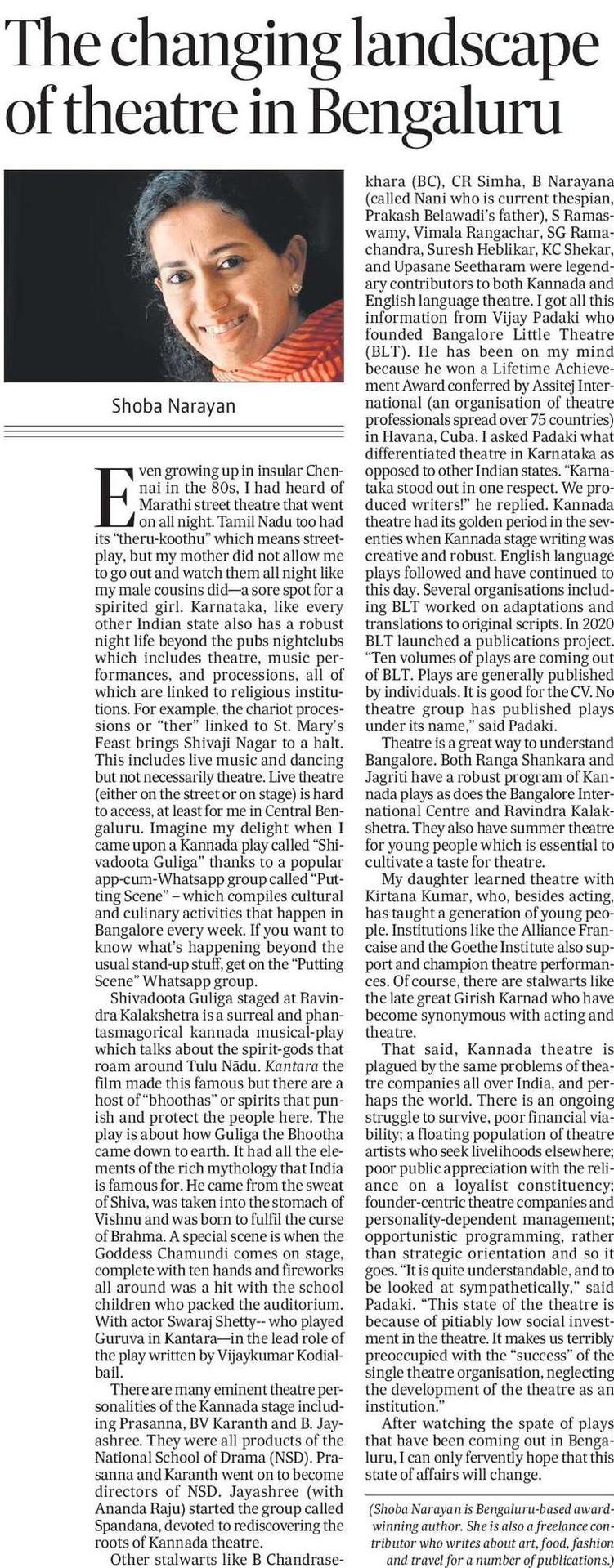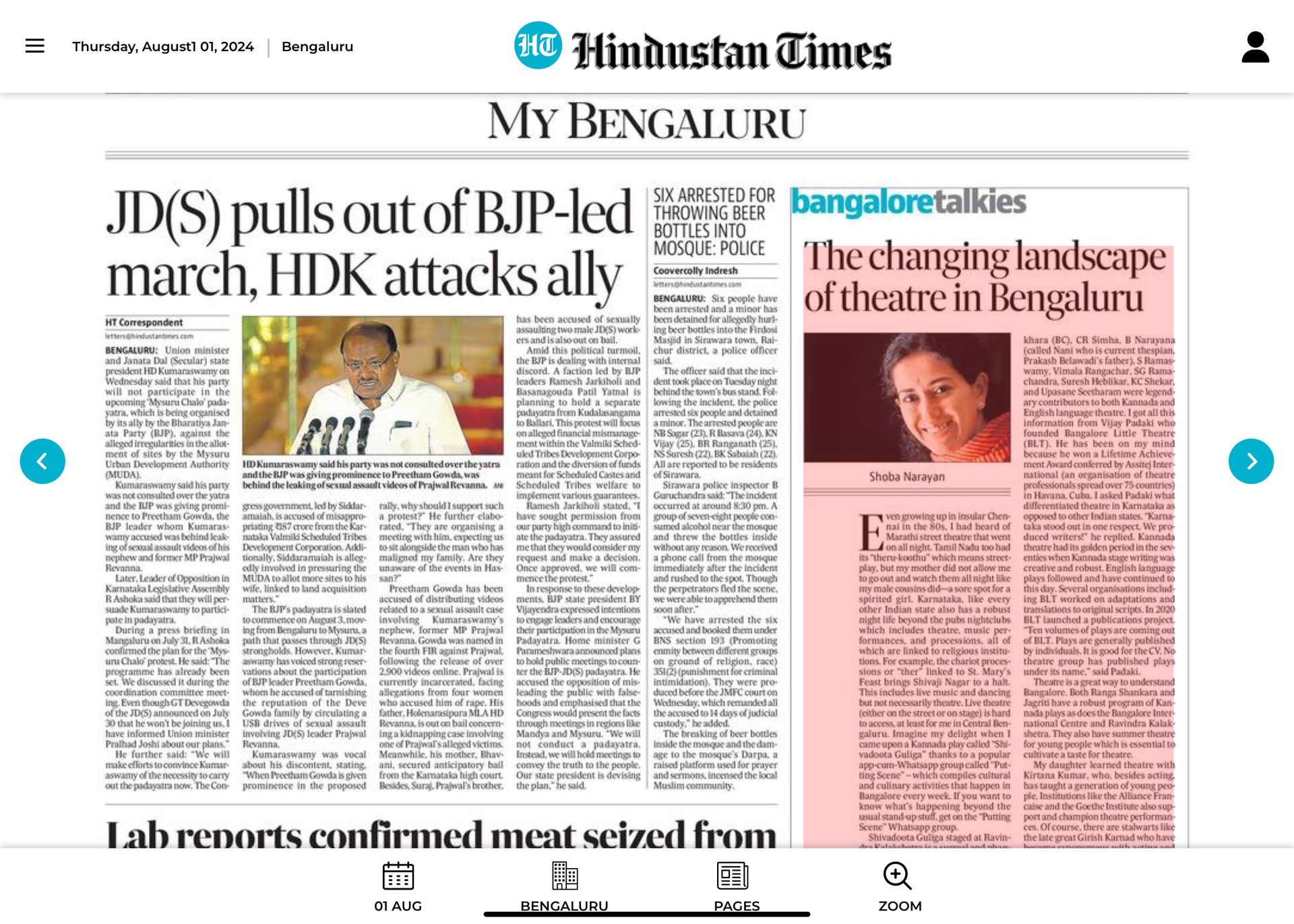Even growing up in insular Chennai in the 80s, I had heard of Marathi street theatre that went on all night. Tamilnadu too had its “theru-koothu” which means street-play, but my mother did not allow me to go out and watch them all night like my male cousins did—a sore spot for a spirited girl. Karnataka, like every other Indian state also has a robust night life beyond the pubs nightclubs which includes theatre, music performances, and processions, all of which are linked to religious institutions. For example, the chariot processions or “ther” linked to St. Mary’s Feast brings Shivaji Nagar to a halt. This includes live music and dancing but not necessarily theatre. Live theatre (either on the street or on stage) is hard to access, at least for me in Central Bangalore. Imagine my delight when I came upon a Kannada play called “Shivadoota Guliga” thanks to a popular app-cum-Whatsapp group called Putting Scene – which compiles cultural and culinary activities that happen in Bangalore every week. If you want to know what’s happening beyond the usual stand-up stuff, get on the “Putting Scene” Whatsapp group.
Shivadoota Guliga staged at Ravindra Kalakshetra is a surreal and phantasmagorical kannada musical-play which talks about the spirit-gods that roam around Tulu Nādu. Kantara the film made this famous but there are a host of “bhoothas” or spirits that punish and protect the people here. The play is about how Guliga the Bhootha came down to earth. It had all the elements of the rich mythology that India is famous for. He came from the sweat of Shiva, was taken into the stomach of Vishnu and was born to fulfil the curse of Brahma. A special scene is when the Goddess Chamundi comes on stage, complete with ten hands and fireworks all around was a hit with the school children who packed the auditorium. With actor Swaraj Shetty– who played Guruva in Kantara—in the lead role of the play written by Vijaykumar Kodialbail.
There are many eminent theatre personalities of the Kannada stage including Prasanna, BV Karanth and B. Jayashree. They were all products of the National School of Drama (NSD). Prasanna and Karanth went on to become Directors of NSD. Jayashree (with Ananda Raju) started the group called Spandana, devoted to rediscovering the roots of Kannada theatre. Other stalwarts like B Chandrasekhara (BC), CR Simha, B Narayana (called Nani who is current thespian, Prakash Belawadi’s father), S Ramaswamy, Vimala Rangachar, SG Ramachandra, Suresh Heblikar, KC Shekar, and Upasane Seetharam were legendary contributors to both Kannada and English language theatre. I got all this information from Vijay Padaki who founded Bangalore Little Theatre (BLT). He has been on my mind because he won a Lifetime Achievement Award conferred by Assitej International (an organisation of theatre professionals spread over 75 countries) in Havana, Cuba. I asked Padaki what differentiated theatre in Karnataka as opposed to other Indian states. “Karnataka stood out in one respect. We produced writers!” he replied. Kannada theatre had its golden period in the seventies when Kannada stage writing was creative and robust. English language plays followed and have continued to this day. Several organisations including BLT worked on adaptations and translations to original scripts. In 2020 BLT launched a publications project. “Ten volumes of plays are coming out of BLT. Plays are generally published by individuals. It is good for the CV. No theatre group has published plays under its name,” said Padaki.
Theatre is a great way to understand Bangalore. Both Ranga Shankara and Jagriti have a robust program of Kannada plays as does the Bangalore International Centre and Ravindra Kalakshetra. They also have summer theatre for young people which is essential to cultivate a taste for theatre. My daughter learned theatre with Kirtana Kumar, who, besides acting, has taught a generation of young people. Institutions like the Alliance Francaise and the Goethe Institute also support and champion theatre performances. Of course, there are stalwarts like the late great Girish Karnad who have become synonymous with acting and theatre.
That said, Kannada theatre is plagued by the same problems of theatre companies all over India, and perhaps the world. There is an ongoing struggle to survive, poor financial viability; a floating population of theatre artists who seek livelihoods elsewhere; poor public appreciation with the reliance on a loyalist constituency; founder-centric theatre companies and personality-dependent management; opportunistic programming, rather than strategic orientation and so it goes. “It is quite understandable, and to be looked at sympathetically,” said Padaki. “This state of the theatre is because of pitiably low social investment in the theatre. It makes us terribly preoccupied with the “success” of the single theatre organization, neglecting the development of the theatre as an institution.”
After watching the spate of plays that have been coming out in Bengaluru, I can only fervently hope that this state of affairs will change.
Shoba Narayan is Bangalore-based award-winning author. She is also a freelance contributor who writes about art, food, fashion and travel for a number of publications.



-k4lD-U204025897261YmH-250x250%40HT-Web.jpg)




Leave A Comment